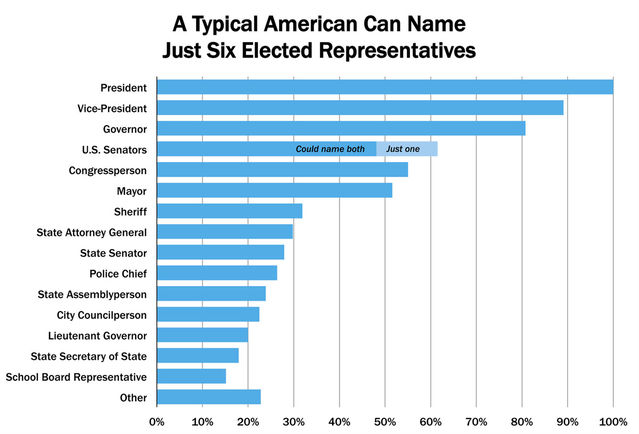Media
Throwing Darts at the Ballot
Voters know almost nothing about downticket candidates (but vote anyway).
Posted June 1, 2016

This year, like every election year, Presidential contenders are getting 24/7 media attention. Downticket candidates, not so much. I did a survey asking Americans to name as many of their elected representative as they could. The average person got only six.
Why should we care? Well obviously, a voter who does not know the name of a mayor or state assemblyperson is unlikely to know much else about her, such as the issues she ran on and any accomplishments, failures, or criminal convictions that would bear on a bid for re-election. There is a connection between voter knowledge and the quality of voter decisions.
The very nadir of voter ignorance may be judicial races. The media don’t cover them. Many voters encounter the names of judicial candidates, for the first and last time, as their stylus hovers over them on the ballot. Judges are usually nonpartisan, so there isn’t even a party affiliation to fall back on. “You know the most frightening thing about judicial elections?” asked political consultant Parke Skelton. “Eighty percent of the people actually pick someone.”
Consultants have to be mavens of voter ignorance. A recent Los Angeles Times piece notes the profusion of “sexy titles” on ballots. Judicial candidates submit a three-word description to appear on the ballot next to their name. Since most voters are completely ignorant of the candidates, the race is mainly about which three-word titles they like best. A “sexy title” is one that pushes the right emotional buttons, like “Violent crimes prosecutor.”
“The sexier the title, the better your chance of getting elected,” political consultant David Gould told the Times. He once brainstormed for a candidate by asking people “what do you hate the most?” The most popular answer was “people who hurt children,” so his candidate self-identified as a “Child molestation prosecutor.” He won.
Hold on a second—doesn’t the candidate have to fit the description? That’s the thing. Candidates are stretching the truth for the sake of a sexy title. Anyone who comes within 20 feet of involvement in a gang case is apt to turn up on the ballot as a “Gang murder prosecutor.”
“My prediction for next election,” Los Angeles County Judge Randoph M. Hammock said, “will be an ‘ISIS/terrorist prosecutor.’”
In my book Head in the Cloud I write of another factor: “foreign-sounding” names. In 1992 the well-respected California judge Abraham Aponte Khan lost to a virtually unknown challenger who had been rated “unqualified” by the Los Angeles County Bar Association. The challenger’s name was Patrick Murphy. He apparently won because the name Murphy sounded more “American” than Khan. The all-American Judge Murphy later resigned over allegations of money laundering and chronic absenteeism.
In 2006 Judge Dzintra Janavs, rated “exceptionally well qualified” by the Bar Association, lost to Lynn Diane Olson, who ran a Hermosa Beach, Calif., bagel store.
The sad fact is that voters choose names almost at random. This turns the ballot into a very effective psychological experiment in hidden bias. It doesn’t do such a good job of electing competent judges.


